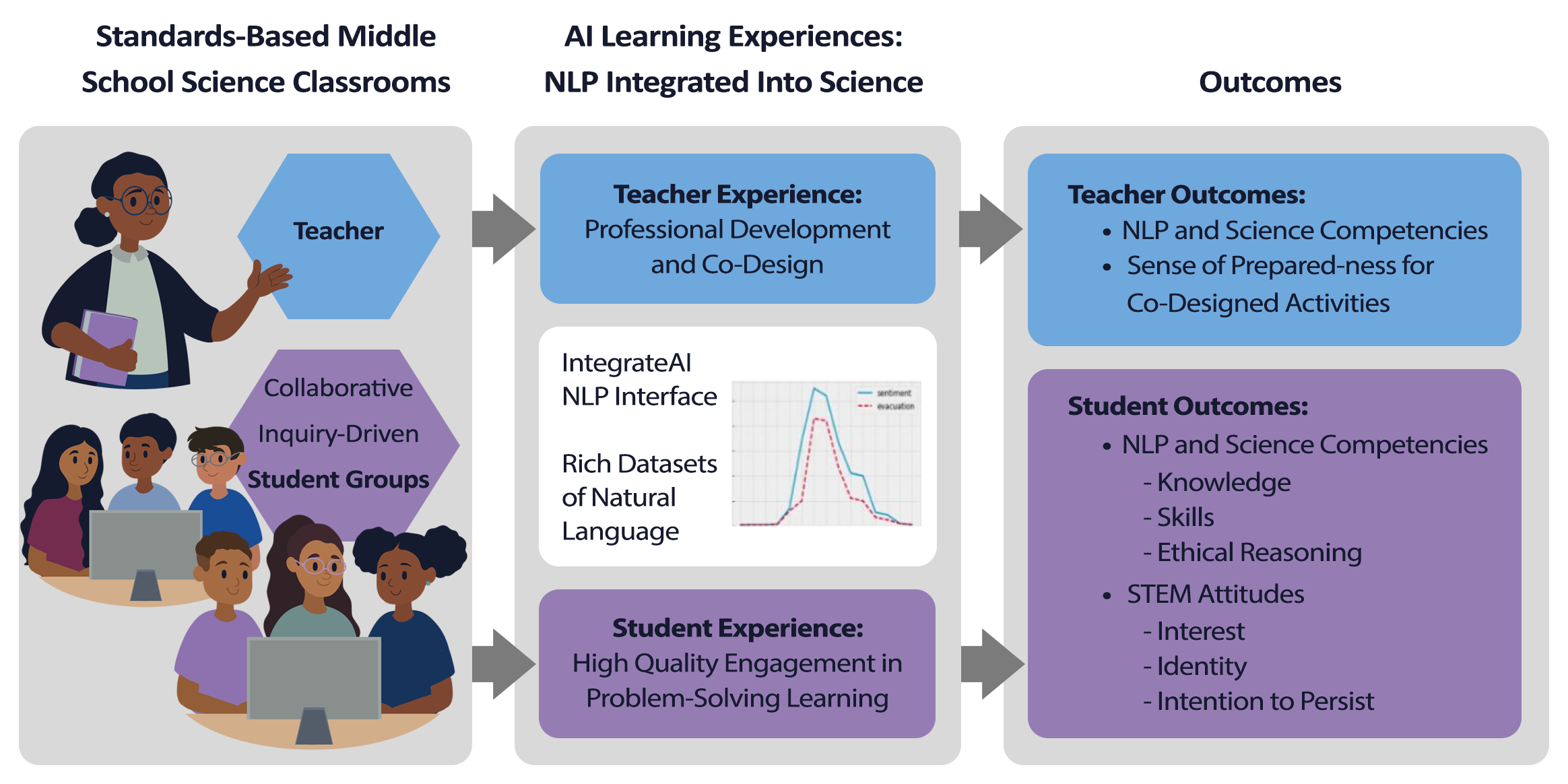
IntegrateAI
Integrating AI Learning into Middle School Science through Natural Language Processing. (Funding: National Science Foundation NSF 19-583, DRL-2147810)
Introduction
Of AI’s many subfields, natural language processing (NLP) is one of the fastest growing. “Natural language” refers to the ways humans communicate with each other, be it through speech, such as in-person conversations and phone calls, or text, such as Twitter, news articles, and text messages. Billions of natural language exchanges happen and are recorded online everyday. With NLP, people can harness the power of AI to automatically understand huge datasets of natural language to answer pressing questions that could benefit society. For example, NLP researchers have long analyzed Google searches related to “flu remedies” to create maps of influenza outbreaks before affected people report their illness to medical authorities. Researchers have also used Twitter data from severe weather events such as hurricanes and blizzards to catalog how people talk about warnings and responses. This project is led by PI Kristy Elizabeth Boyer, PI Krista Glazewski (School of Education, Indiana University), co-PI Mehmet Celepkolu (Computer Science, University of Florida), Co-PI Cindy Hmelo-Silver (School of Education, Indiana University), Co-PI Asmalina Saleh (Center for Research on Learning and Teaching, Indiana University), Co-PI Thomas Brush (School of Education, Indiana University).
Project Description
Project IntegrateAI will integrate AI learning through NLP into middle school science through participatory co-design with middle school teachers. Middle school science provides an excellent context for integrating NLP because of the focus on inquiry-oriented science and the value in being able to identify and use textual resources. Project IntegrateAI will bring potentially transformative learning experiences to middle school teachers and students: for teachers, we will support development of competencies (knowledge and skills around NLP and science; ethical reasoning) as well as achieve a sense of preparedness to bring authentic, inquiry-based NLP experiences into their science classrooms. For students, these innovative experiences will foster competencies (knowledge and skills around NLP and science; ethical reasoning) and attitudes toward STEM careers (interest, identity, and intention to persist).
publications
| 2024 | |
| [3] | Learning about NLP in Middle School Science. Srijita Chakraburty, Cindy Hmelo-Silver, Krista Glazewski, Gloria Ashiya Katuka, Mehmet Celepkolu, Kristy Elizabeth Boyer. Proceedings of the 18th International Conference of the Learning Sciences (ICLS), New York, 2024, pp. 2153-2154. [bib] |
| [2] | Integrating Natural Language Processing in Middle School Science Classrooms: An Experience Report. Gloria Ashiya Katuka, Srijita Chakraburty, Hyejeong Lee, Sunny Dhama, Toni Earle-Randell, Mehmet Celepkolu, Kristy Elizabeth Boyer, Krista G. Glazewski, Cindy E. Hmelo-Silver, Tom McKlin. Proceedings of the 55th ACM Technical Symposium on Computer Science Education (SIGCSE), Portland, Oregon, 2024, pp. 639-645. [bib] |
| 2023 | |
| [1] | NLP4Science: Designing a Platform for Integrating Natural Language Processing in Middle School Science Classrooms. Sunny Dhama, Gloria Ashiya Katuka, Mehmet Celepkolu, Kristy Elizabeth Boyer, Krista Glazewski, Cindy Hmelo-Silver. IEEE Symposium on Visual Languages and Human-Centric Computing (VL/HCC), 2023, pp. 1-3. [bib] [doi] |

